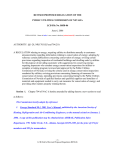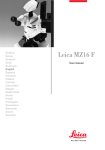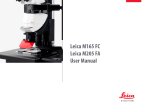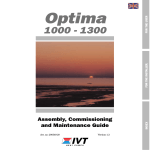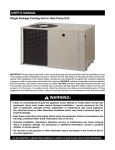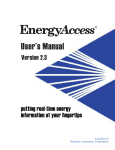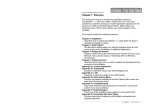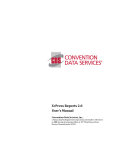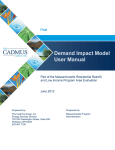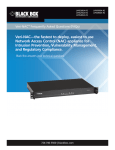Download LCB File No. R058-06 PROPOSED REGULATION OF THE PUBLIC
Transcript
LCB File No. R058-06 PROPOSED REGULATION OF THE PUBLIC UTILITIES COMMISSION OF NEVADA BEFORE THE PUBLIC UTILITIES COMMISSION OF NEVADA Investigation and rulemaking regarding energy ) savings and utilities’ use of energy efficiency ) measures to comply with the renewable energy ) portfolio standard, the modification of ) renewable energy net metering regulations, and ) the modification and/or repeal of regulations ) concerning conservation of energy in residences. ) __________________________________________) Docket No. 05-7050 NOTICE OF INTENT TO AMEND/ADOPT REGULATIONS; NOTICE OF WORKSHOP AND NOTICE OF HEARING NOTICE IS HEREBY GIVEN that the Public Utilities Commission of Nevada (“Commission”) will hold a WORKSHOP on Wednesday, May 10, 2006, 10:30 a.m., at the offices of the Commission, Hearing Room A, 101 Convention Center Drive, Suite 250, Las Vegas, Nevada 89109 via videoconference to Hearing Room A, 1150 East William Street, Carson City, Nevada 89701, at which time interested persons may appear and be heard. This workshop may be continued day to day as necessary. The purpose of this workshop is to receive comments from all interested persons regarding the proposed regulations consisting of additions, revisions, and deletions to the Commission’s regulations concerning conservation of energy in residences. The proposed language updates NAC 704.800-704.876 to reflect current efficiency standards. NOTICE IS HEREBY GIVEN that the Commission will hold a HEARING on Wednesday, May 10, 2006, 11:00 a.m., at the offices of the Commission, Hearing Room A, 101 --1-Agency Draft of Proposed Regulation R058-06 Convention Center Drive, Suite 250, Las Vegas, Nevada 89109 via videoconference to Hearing Room A, 1150 East William Street, Carson City, Nevada 89701, at which time interested persons may appear and be heard. This hearing may be continued day to day as necessary. The purpose of this hearing is to receive comments from all interested persons regarding the proposed regulations consisting of additions and revisions to the Commission’s regulations concerning conservation of energy in residences. The proposed language updates NAC 704.800-704.876 to reflect current efficiency standards. The following information is provided pursuant to the requirements of NRS 233B.0603: On July 27, 2005, the Commission voted to open an investigation and rulemaking regarding energy savings and utilities’ use of energy efficiency measures to comply with the renewable energy portfolio standard, and the modification of renewable energy net metering regulations. This matter has been designated by the Commission as Docket No. 05-7050. At a duly noticed agenda meeting held on October 27, 2005, the Commission voted to expand the scope of this docket to include the modification and/or repeal of regulations concerning conservation of energy in residences. The Presiding Officer designated the regulations regarding energy savings and utilities’ use of energy efficiency measures to comply with the renewable energy portfolio standard, and the modification of renewable energy net metering regulations as Phase I, and the regulations concerning conservation of energy in residences as Phase II. On February 17, 2006, the Commission issued an Order adopting the Phase I regulations as permanent. This Notice pertains to the Phase II regulations. The proposed Phase II regulations potentially affect all entities that practice before the Commission. At this time, the Commission cannot quantify either the adverse or beneficial --2-Agency Draft of Proposed Regulation R058-06 economic effects on the entities affected by the regulation or the public, either immediate or long-term, which may result from the regulation. The methodology used by the Regulatory Operations Staff of the Commission to determine the impact of proposed regulations on small businesses is called the Delphi Method. The Delphi Method is a systematic interactive forecasting method based on independent inputs of selected experts. The experts form a consensus opinion after reviewing the proposed regulation to determine the likely impact of the regulation on small businesses and the public. The Commission cannot quantify at this time any increase in costs associated with enforcement of these proposed regulations. The regulations do not overlap or duplicate any other state or local federal government regulation, nor do they establish any new fee or increase an existing fee. Persons wishing to comment upon the proposed action of the Commission may appear at the scheduled public workshop and/or hearing, or address their comments, data, views, or arguments, in written form, to the Secretary of the Commission, 1150 E. William Street, Carson City, Nevada 89701 or 101 Convention Center Drive, Suite 250, Las Vegas, Nevada 89109. Written submissions must be received by the Commission on or before Wednesday, May 3, 2006. A copy of this notice and the proposed regulations will be on file at the State Library, 100 Stewart Street, Carson City, Nevada, for inspection by members of the public during business hours. Additional copies of the notice and the proposed regulations will be available at the offices of the Commission, at 1150 East William Street, Carson City, Nevada 89701 and 101 Convention Center Drive, Suite 250, Las Vegas, Nevada 89109; and in all counties in which an office of the agency is not maintained, at the main public library, for inspection and copying by --3-Agency Draft of Proposed Regulation R058-06 members of the public during business hours. This notice and the text of the proposed regulations will also be available in the State of Nevada Register of Administrative Regulations, which is prepared and published monthly by the Legislative Counsel Bureau pursuant to NRS 233B.0653, and on the Internet at http://www.leg.state.nv.us. Copies of this notice and the proposed regulations will also be mailed to members of the public upon request. A reasonable fee may be charged for copies if it is deemed necessary. Upon adopting any regulation, the agency, if requested to do so by an interested person, either before adoption or within 30 days thereafter, shall issue a concise statement of the principal reasons for and against its adoption, and incorporate therein its reason for overruling the consideration urged against its adoption. This notice has been posted at the county courthouses located in Reno, Carson City, and Las Vegas. --4-Agency Draft of Proposed Regulation R058-06 LCB File No. R058-06 PROPOSED REGULATION OF THE PUBLIC UTILITIES COMMISSION OF NEVADA PROPOSED MODIFICATIONS TO COMMISSION REGULATIONS FOR CONSERVATION OF ENERGY IN RESIDENCES Section 1. NAC 704.800 Applicability. 1. NAC 704.800 to 704.876, inclusive, apply to [Idaho Power Company, ] Nevada Power Company, Sierra Pacific Power Company and Southwest Gas Corporation. 2. [Idaho Power Company will be exempted from the requirements of all those sections except NAC 704.868 and 704.870 if it notifies the Public Utilities Commission of Nevada in writing within 30 days after May 17, 1984, that it will provide eligible customers in Nevada with the same services as those it is required to provide to its customers in Idaho under that state’s plan, adopted pursuant to 10 C.F.R., Part 456, for conservation of energy in residences.] 3. Utilities which have overlapping areas of service may enter into reasonable agreements to reduce or eliminate duplication of efforts in undertaking services pursuant to NAC 704.800 to 704.876, inclusive. Sec. 2. NAC 704.802 Definitions. As used in NAC 704.800 to 704.876, inclusive, unless the context otherwise requires: 1. “Eligible customer” means a person who: (a) Owns or occupies a residential building or a dwelling unit therein (except that the owner of the common areas in a residential building containing five or more dwelling units is not an eligible customer for the purposes of the common areas); and (b) Receives a bill from a utility for electricity or fuel used in such a building. 2. “Inspection” means an inspection conducted pursuant to NAC 704.814. 3. “Residential building” means any building used for residential occupancy which: (a) [Was built before July 1, 1978; and] [(b)] Has a system for heating or cooling, or both, and contains one or more dwelling units, except that the term does not include a building which contains more than four dwelling units if it has a central heating or cooling system. 4. “R-value” means the reciprocal of the thermal transmission in a unit of time through a unit of area in a particular body or assembly having defined surfaces when the unit average temperature difference is established between the surfaces. Sec. 3. NAC 704.804 Announcements to eligible customers. 1. Each utility shall [, within 6 months after May 17, 1984, and again within 6 monts before January 1, 1985] annually distribute to each of its eligible customers an announcement which contains: (a) A list of measures which may be taken to conserve energy in a typical residential building located in the area served by the utility. --5-Agency Draft of Proposed Regulation R058-06 (b) A reasonable range of [estimates of] estimated costs of the measures and the savings in the cost of energy which are likely to result in the first year after carrying out each of the measures in such a building. (c) A list of practices for conserving energy in such a building. (d) A reasonable range of estimates of the savings in the cost of energy which are likely to result in the first year after adoption of those practices. (e) A description of each of the services to be provided pursuant to NAC 704.800 to 704.876, inclusive, and an offer to perform each of those services. The offer to inspect residential buildings may be conditioned so that the utility may schedule its inspections in a particular geographic area at or near the same time, but each eligible customer must be given an opportunity to have his residence examined by January 1, 1985. (f) A statement that federal tax credits may be available as the result of expenditures incurred for installations to conserve energy, and that the customer should communicate with the nearest office of the Internal Revenue Service for additional information. 2. Any person who becomes an eligible customer after the first distribution of a utility’s announcement of its program must be provided with a copy of the announcement within 60 days after [he becomes] becoming an eligible customer. Sec. 4. NAC 704.806 List of measures to conserve energy. A utility’s announcement to be made pursuant to NAC 704.804 must include the following items in its list of measures which an eligible customer may take to conserve energy in a residential building or dwelling unit: 1. Reducing the passage of air and moisture by filling small gaps around the fixed joints of window and door frames (caulking). 2. Reducing the passage of air and moisture by the installation of weather stripping over or in movable joints of windows and doors. 3. Modifying the system used for heating the building, by: (a) Replacing an electric furnace, boiler, or heat pump [which is more than 5 years old] with similar but more efficient equipment or with a gas-fired system if it has a lower cost of operation; (b) Replacing a furnace or boiler which is fired by natural gas [which is more than 10 years old] with a more efficient furnace or boiler fired by natural gas; or (c) Replacing an oil burner with a more efficient oil burner or with a gas-fired system if it has a lower cost of operation. As used in this paragraph, an oil burner is a device which atomizes fuel oil, mixes it with air and ignites the mixture and is an integral part of an oil-fired furnace or boiler, including the combustion chamber. 4. Replacing a central air conditioner [which is more than 5 years old] with a more efficient air conditioner. 5. Placing insulation or increasing existing insulation: (a) Between the conditioned area of the building and an unconditioned attic [if the difference between the effective R-value of existing insulation and the applicable level set forth in NAC 704.862 is R-11 or more and the building is not a mobile home] to achieve an effective R-value of at least R-30. [(b) Where the conditioned area of the building extends to the roof, between the underside and upperside of the roof or on the exterior surface of the roof, if the difference between the --6-Agency Draft of Proposed Regulation R058-06 effective R-value of the existing insulation and the applicable level set forth in NAC 704.862 is R-11 or more and the building is not a mobile home] [(c)] (b) Within or on the walls between conditioned and unconditioned areas of the building or the outside. [(d)] (c) Between the first conditioned level of the building and an unconditioned basement, a crawl space or open area beneath the building. [(e)] (d) On the surface of a heating or cooling duct in an unconditioned area of the building. [(f)] (e) On the exterior surface of a hydronic heating or cooling pipe in an unconditioned area of the building. [(g)] (f) On the exterior surface of the casing of a water heater. 6. Installing insulated skirting to enclose the space between a mobile home and the ground. 7. Placing window or glazing material outside or inside an ordinary or prime window to create an air space between the windows or glazing materials and provide greater resistance to the flow of heat, i.e., installing a storm window. 8. Installing a thermal window, consisting of two or more sheets of glazing material affixed to a window frame to create one or more air spaces between the glazing materials and provide greater resistance to the flow of heat. 9. Installing heat-reflective or heat-absorbent glazing material in windows or doors or applying reflective or absorptive films or coatings to existing windows or doors. 10. Installing a [clock] programmable thermostat which will reduce the consumption of energy in a heating or cooling system by switching the temperature in interior spaces automatically from one level to another. 11. Installing insulated shutters and shades on the inside or outside of existing windows to reduce the loss or gain of heat. 12. Replacing a water heater which operates by electric resistance with a gas water heater [which operates by an electric pump]. 13. Using an insulating cover on a heated swimming pool during the night. 14. Installing a solar water heating system and/or photovoltaic panels. Sec. 5. NAC 704.808 List of practices. A utility’s announcement to be made under NAC 704.804 must include the following items in its list of practices which an eligible customer may adopt to conserve energy: 1. Subscribing to the electric utility’s time-of-use rate and avoiding energy use during onpeak hours. [1.] 2. Cleaning and adjusting a gas or oil-fired furnace to increase the efficiency of the combustion. [2.] 3. [Periodically] Regular cleaning or replacing the air filters on a forced-air heating or cooling system. [3.] 4. Lowering the setting of the bonnet or plenum thermostat setting to 80ºF on a gas or oilfired, forced-air furnace. [4.] 5. Turning off the pilot light on a gas-fired furnace during the summer. [5.] 6. Manually lowering the setting of the thermostat for a furnace during the heating season to a maximum of 55º F during sleeping hours. [6.] 7. Limiting the maximum setting of the thermostat for a furnace to [68] 65 º F during the heating season. [7.] 8. Setting the thermostat for an air conditioner to 78 º F or higher during the cooling season. --7-Agency Draft of Proposed Regulation R058-06 [8.] 9. Placing a device on a shower head or faucet to limit the maximum flow to [3] 2.5 gallons per minute, or replacing existing shower heads or faucets with those having built-in provisions for limiting the maximum flow to [3] 2.5 gallons per minute [9.] 10. Manually reducing the setting of the thermostat for a water heater to 120 º F unless a higher setting is required for proper operation of a dishwasher. [10.] 11. Reducing the use of heated water for washing clothes. [11.] 12. Reducing the thermostatic setting to 55 º F when a dwelling unit is empty for 4 hours or longer in a heating season. [12.] 13. Raising the setting of a thermostat for an air conditioner to 90 º F in the cooling season when no one is in the dwelling unit. [13.] 14. Turning an electric water heater off or a gas water heater to “pilot” when a dwelling unit is vacant for 2 days or longer. [14.] 15. Installing [scrap] insulation or other pliable materials in gaps around pipes, ducts, fans, or other equipment which enters the attic or basement from a heated space. [15.] 16. Installing fireproof material to plug any holes around a damper in a fireplace. [16.] 17. Adding insulation to an attic or basement door. [17.] 18. Caulking any leak in a heating or cooling duct. [18.] 19. Tightening or plugging any leaky joints in hot water or steam pipes. [19.] 20. Replacing washers in leaky water valves. [20.] 21. Using shades or drapes to: (a) Block sunlight from entering a building in the cooling season; (b) Allow sunlight to enter a building during the heating season; and (c) Cover windows tightly at night during the heating season. [21.] 22. Using and maintaining fireplaces and wood stoves in such a manner as to reduce the consumption of fuel and maximize the output of heat. [22.] 23. When buying appliances, selecting those which have the Energy Star rating or otherwise use energy efficiently. [23.] 24. Maintaining and operating appliances in an efficient manner. [24.] 25. [Substituting insulated pads for] Avoid use of any waterbed heaters [25.] 26. Using compact fluorescent light bulbs or reducing the wattage ratings of incandescent light bulbs. [26.] 27. Connecting lights to dimmer switches or timers. [27.] 28. Installing devices which automatically control the filtering or heating system used for a swimming pool. [28.] 29. Reducing the passage of air and moisture by filling small gaps: (a) In the fixed joints of the building; (b) Under baseboards inside the building; (c) In exterior walls at electric outlets; (d) Around pipes and wires entering the building; or (e) Around dryer vents and exhaust fans in exterior walls. Sec. 6. NAC 704.810 Savings to be based on typical dwelling. 1. In a utility’s announcement of its program for conserving energy in residential buildings, each of its estimates of savings in the cost of energy must be expressed as a percentage of the total amount of energy consumed in a typical single-family dwelling located in the area served by the utility. --8-Agency Draft of Proposed Regulation R058-06 2. A typical building in northern Nevada: (a) Is one story. (b) Is of wood frame construction. (c) Has [1,500] 1,800 square feet of floor area. [(d) Is 60 feet by 25 feet.] [(e)] (d) Has 8-foot walls. [(f)] (e) Has [1,500] 1,800 square feet of attic area. [(g)] (f) Has a crawl space beneath the floor. [(h)] (g) Has ceiling insulation rated as [R-11] R-38. [(i)] (h) Has wall insulation rated as [R-11] R-13. [(j)] (i) Has between 50 and 60 square feet of window area facing south. [(k)] (j) Has 20 square feet of door area. [(l)] (k) Has all its heating and cooling ducts in unconditioned areas. [(m)] (l) Exchanges air 1.5 times each hour. [(n)] (m) Has a gas-fired heating system whose average seasonal level of efficiency is [70 percent] a minimum of 74 percent and best practice efficiency of 94%. 3. A typical building in southern Nevada: (a) Is one story. (b) Is of wood frame construction. (c) Has [1,500] 1,800 square feet of floor area. [(d) Is 60 feet by 25 feet.] [(e)] (d) Has 8-foot walls. [(f)] (e) Has [1,500] 1,800 square feet of attic area. [(g)] (f) Is constructed on a concrete slab. [(h)] (g) Has ceiling insulation rated as [R-11] R-38. [(i)] (h) Has wall insulation rated as [R-11] R-13. [(j)] (i) Has between 50 and 60 square feet of window area facing south. [(k)] (j) Has 20 square feet of door area. [(l)] (k) Has all its heating and cooling ducts in unconditioned areas. [(m)] (l) Exchanges air 1.5 times each hour. [(n)] (m) Has a gas-fired heating system whose average seasonal level of efficiency is [70 percent] a minimum of 74 percent and best practice efficiency of 94%. [(o)] (n) Has an electric air-conditioning system whose energy efficiency ratio is 7. 4. The estimates must be based on calculations contained in the [1981 Fundamentals Handbook] ASHRAE- Energy Standard 90.1, 2001 User Manual published by the American Society of Heating, Refrigeration and Air-Conditioning Engineers or on other calculations which produce results within 20 percent of those produced through use of the [1981 Fundamentals Handbook] 2001 ASHRAE Standard 90.1, 2001 User Manual. That manual, as it exists on [May 17, 1984] January 1, 2006, is hereby adopted by reference. A copy of that handbook may be obtained from ASHRAE, Publication Sales Department, 1791 Tullie Circle, N.E., Atlanta, Georgia 30329, for a price of [$78] $95. 5. After presenting its estimates of savings, the utility shall add the following caveat: ENERGY SAVINGS DEPEND UPON MANY FACTORS. THE ESTIMATES CONTAINED IN THIS ANNOUNCEMENT ARE BASED ON ESTIMATES FOR TYPICAL HOUSES. YOUR ACTUAL SAVINGS IN THE COST OF ENERGY MAY --9-Agency Draft of Proposed Regulation R058-06 BE LESS THAN THE ESTIMATES PROVIDED HERE IF YOUR HOUSE IS OF A DIFFERENT SIZE OR IF YOUR HABITS OF USING ENERGY ARE DIFFERENT FROM THOSE ASSUMED. THE INSPECTION WHICH WE OFFER WILL PROVIDE MORE SPECIFIC ESTIMATES FOR YOUR HOUSE. Sec. 7. NAC 704.814 Inspections by utility; exceptions. 1. Except as otherwise provided in subsections 2 and 3, each utility shall, upon request of an eligible customer, perform an inspection of his residential building or dwelling unit to obtain data on which to base specific suggestions or advice for conserving energy. 2. A utility need not conduct an inspection of any residential building or dwelling unit therein if a similar inspection of the building or unit was made for the same owner within the previous 12 months. If a similar inspection of the building or unit was made for a previous owner, the utility must provide the eligible customer with a copy of the data collected during the previous inspection and a copy of the results of that inspection at no charge, and must provide the eligible customer with all other services required to be provided by NAC 704.800 to 704.876, inclusive. 3. If a residential building contains more than four dwelling units, the data and results provided to the eligible customer may be based on a sampling of the various types of dwelling units in the building. Sec. 8. NAC 704.816 Time for inspection; quarterly report. 1. A utility shall make the inspection of an eligible customer’s residential building or dwelling unit within 60 days after the date of the customer’s request for the inspection. 2. The inspection may be conducted during daylight hours on the utility’s normal working days unless the customer requests that it be conducted during daylight hours on a Saturday. 3. The utility shall file with the Commission a quarterly report stating the number of inspections it has performed in the previous quarter, and the number of requests for inspection which it was unable to fulfill in compliance with this section and outlining proposed actions to ensure future compliance. Sec 9. NAC 704.818 Qualifications of inspectors. 1. Each inspector who conducts an inspection pursuant to NAC 704.814 must have: (a) Successfully completed a Commission-reviewed and approved training program administered by the utility or by a third person authorized by the utility or under contract with it; (b) Passed a written test, approved by the Commission, showing his proficiency to serve as an inspector; or (c) Been certified to perform such inspections under another state’s program of residential services for conservation of energy. 2. In addition to meeting the requirement set forth in subsection 1, such an inspector must be: (a) Employed by the utility or a third person under contract with the utility to perform such inspections; and (b) Proficient in the particular functions for which he will be responsible during the inspections. Sec. 10. NAC 704.820 Proposed methodology for performing inspections. 1. Each utility shall develop a proposed methodology for performing its residential inspections and shall submit its proposed methodology to the Commission for approval. --10-Agency Draft of Proposed Regulation R058-06 2. Except as otherwise provided in NAC 704.822, the proposed methodology must require that: (a) The inspector’s calculations be based upon data collected by him from actual measurements of the interior and exterior of the building and inspection of the equipment used for heating and cooling spaces and heating water. (b) The data collected be in sufficient detail to enable the inspector to provide the customer with the following information: (1) A reasonably accurate estimate of the total cost, including materials and labor, to have an installer listed by the Commission install the appropriate material and equipment for each applicable measure for conserving energy. (2) A reasonably accurate estimate of the total cost for the eligible customer [himself] to purchase and install the appropriate material and equipment for each of those measures [other than] including replacing a central air conditioner, installing wall insulation, or replacing or modifying a furnace, boiler, or heat pump. (3) A reasonably accurate estimate of the total savings in energy, expressed in dollars as well as kilowatt hours of electric energy or cubic feet of gas, which would be likely to occur during the first year following completion of each applicable measure. (4) An estimate of the savings, after taking into consideration any available federal tax credits, in cost of energy, expressed in dollars, which would be likely to occur during the first year following completion of all applicable measures, assuming that those measures are carried out in the order of the shortest simple pay back, which is calculated by dividing the estimated cost of installation by the estimated saving from the measure in the first year. Sec. 11. NAC 704.822 Alternatives to actual measurements and inspection. In place of calculations based upon actual measurements and inspection as described in subsection 2 of NAC 704.820, a utility’s proposed methodology may allow: 1. A measure for conserving energy to be evaluated without the actual measurements if the estimated costs of installation and the savings in energy which would result from such an installation in the typical house within the applicable climatic zone would not vary more than 15 percent from the costs and savings which would be determined if actual measurements were used. 2. An inspector to use the [information contained in the following table: EFFICIENCIES OF EQUIPMENT IN STEADY STATE GAS-FIRED EQUIPMENT BOILERS DUCT FURNACE CENTRAL FURNACE (INDOOR INSTALLATION) CENTRAL FURNACE (OUTDOOR INSTALLATION) DIRECT VENT WALL FURNACE VENTED WALL FURNACE VENTED ROOM HEATER EFFICIENCY IN PERCENT 80 80 --11-Agency Draft of Proposed Regulation R058-06 80 80 80 80 80 OIL-FIRED EQUIPMENT BOILER-DRY BACK BOILER-WET BACK CENTRAL FURNACE FLOOR FURNACE WALL FURNACE CONVENTIONAL IMPROVED BURNER BURNER Efficiencies in Percent 70 80 82 72 72 75 81 85 75 75 ENERGY EFFICIENCY RATIONS FOR ELECTRIC CENTRAL AIR CONDITIONERS AGE OF EQUIPMENT (In Years) NEW 0-2 3-7 8 RATIOS 7.2 6.8 6.5 6.1] International Energy Conservation Code (2006) which is available for $35 from Construction Book Exzpress, Inc, 30 Oser Ave, Suite 300, Hauppage, NY 11788 or from www.constructionbook.com. Sec. 12. NAC 704.826 Determination of [applicability] suitability of measures for conservation. 1. While inspecting a residential building or dwelling unit, the inspector shall determine the [applicability] suitability of each measure for conservation. 2. In determining whether a measure is [applicable] appropriate, the inspector shall abide by the following criteria: (a) A measure is not [applicable] appropriate if it has already been carried out. (b) A measure is not [applicable] appropriate if the necessary installations would be in violation of any federal, state or local law or regulation. (c) Putting insulation in walls is not an [applicable] appropriate measure unless there is no insulation in a substantial portion of the exterior walls [and the building is not a mobile home]. (d) Putting insulation in floors is not an [applicable] appropriate measure unless the building is in northern Nevada and there is no floor insulation present. (e) The installation of heat-absorbing or heat-reflective glass or other material in windows or doors is not an [applicable] appropriate measure unless the building or unit has a central or room air conditioner or an evaporative cooler and the windows and doors upon which the heatabsorbing or heat-reflective material would be installed are not shaded or facing within 45E of true North. (f) Thermal windows are only applicable as shown in the table contained in NAC 704.862. --12-Agency Draft of Proposed Regulation R058-06 Sec. 13. NAC 704.828 Designation of measures to be evaluated only upon request. 1. Although a utility may suggest conservation measures, a utility may [designate] select a measure for conserving energy as a measure to be evaluated only upon a customer’s request. Such [a designation must be based upon] an evaluation must consider: (a) The frequency of recommendations for installation of the measure made in prior inspections; (b) All costs and benefits; [(b)] (c) The length of the payback period; [or] and [(c)] (d) Special conditions which affect savings in energy, cost-effectiveness, and the likelihood of the measure being installed by the customer after the inspection. [2. At the time such a designation is made, the utility shall notify the Commission of the designation and provide data supporting it.] Sec. 14. NAC 704.830 Inspection if primary source of energy not sold by utility. If an inspector finds that a furnace, boiler, or heat pump in a residential building or dwelling unit uses as its primary source of energy any fuel or source of energy other than a fuel or source of energy sold by the utility which [employs him] serves the customer, he shall not consider replacing the existing equipment with more efficient equipment unless he first obtains the customer’s signature to the following statement: Although the (name of utility) has personnel qualified to conduct an inspection of your (furnace, boiler or heat pump), if your home is heated by a fuel or source of energy other than (types of fuels supplied by utility), the utility cannot inspect your furnace, boiler or heat pump unless you specifically request it to do so. Federal law requires that such a request be made in writing. If you want us to inspect your furnace, although we do not supply the fuel for it, please sign below. Sec. 15. NAC 704.832 Inspector to offer insulating jacket and devices for limiting flow through shower head; explanation of thermostats; installations. 1. While inspecting a residential building or dwelling unit for an eligible customer, the utility’s inspector shall offer: (a) To supply the customer, at no charge [to him], an insulating jacket for the water heater and devices for limiting the maximum flow of water through the shower heads to [3] 2.5 gallons per minute; and (b) To explain to [him] the customer how to make adjustments to the thermostats for the furnace and air conditioner and how to reduce the setting of the thermostat for the water heater to 120ºF. 2. A utility shall not supply or install any material or equipment, including the jacket described in subsection 1, to carry out a measure for conservation of energy or finance such a measure except in accordance with NAC 704.856 and 704.858. Sec. 16. NAC 704.834 Results of inspection; duties of inspector. 1. After performing an inspection, the inspector shall furnish the customer a written statement of the results of the inspection. The results must include the appropriate information as described in NAC 704.820, 704.826, and 704.830 but must not include information about a measure for --13-Agency Draft of Proposed Regulation R058-06 conservation of energy unless it is one of the measures listed in NAC 704.806. If the results are not given in person, the inspector shall send the customer a written sample of the typical format of the results and a brief explanation of how to interpret them. 2. The inspector shall also: (a) Explain to the customer how [he can] to select the appliances which use energy most efficiently and how [he can] to improve the efficiency of the existing appliances in his household; (b) Furnish the customer information on how [he can] to install the appropriate material or equipment himself to accomplish measures other than the replacement of a central air conditioner, installation of wall insulation, or the replacement of or modifications to a furnace, boiler, or heat pump; (c) Describe and explain to the customer the benefits of any programs administered by this State or sponsored by the utilities for making houses energy-efficient and weather-tight, and the availability of any similar assistance to persons of low income, including the criteria for eligibility and the name and telephone number of the appropriate local agency; and (d) Give the customer a toll-free telephone number of a representative of the utility who is available to provide: (1) Consultation regarding the results. (2) A description and explanation of: (I) The services available to aid the customer in arranging for the installation and financing; (II) The availability of the lists of suppliers, installers, and lenders; (III) The warranties; (IV) The inspections required to be provided by the utility after installations; and (V) The services provided by the utility to resolve disputes. Sec. 17. NAC 704.836 Retention of data and results. 1. Each utility shall retain a copy of the data collected during each inspection of a residential building or dwelling unit and a copy of the results furnished to the eligible customer. The copies must be retained for 5 years after the date of the inspection. 2. The utility shall inform each new customer that such data and results for [his] new residences may be available. Sec. 18. NAC 704.838 Information concerning bids from installers and suppliers. Each utility shall, upon the request of any customer whose residential building or dwelling unit has been inspected, [give him] provide information and assistance on the following matters: 1. How to obtain, accept, and reject bids from installers or suppliers listed by the Commission. 2. How to interpret bids received. 3. What a customer should expect to receive in goods or services from such a listed supplier or installer. Sec. 19. NAC 704.840 Lists of qualified suppliers, installers and lenders. The Commission will prepare and maintain master lists of qualified suppliers, installers, and lenders. The list will contain the following information regarding each supplier, installer, or lender: 1. [His] name and address. --14-Agency Draft of Proposed Regulation R058-06 2. The material or equipment [that he supplies or installs] supplied or installed or the financing [that he provides] provided to carry out measures for conserving energy. 3. The territory [which he serves] served. Sec. 20. NAC 704.842 Application for inclusion in list of suppliers. A person who wishes to have the name of his/her business included in the Commission’s list of suppliers must submit a signed application in which he/she agrees: 1. To supply only those products which are subject to the warranties described in NAC 704.864 and to post in a conspicuous place in each place of business where those products are sold and in any catalog offering those products by mail order, a statement setting forth the warranties and identifying each product which is so warranted. 2. To furnish each customer with a copy of the appropriate warranties. 3. To participate in good faith in the informal resolution of any complaints. 4. To submit to binding arbitration for the purpose of resolving complaints regarding the supply of products applicable to measures for conservation of energy. 5. To comply with all applicable federal, state, and local laws and regulations. Sec. 21. NAC 704.844 Application for inclusion in list of installers. A person who wishes to have his/her name included in the Commission’s list of installers must submit a signed application in which he/she agrees: 1. To install only products which are covered by a manufacturer’s warranty as described in NAC 704.864. 2. To provide each customer with a written warranty as described in that section. 3. To furnish each customer, before any work is commenced, a written contract setting forth in detail the work to be performed, and an itemized listing of the costs of the labor and materials to be provided under the contract. 4. To comply with all applicable federal, state, and local laws, regulations and licensing requirements. 5. To make a bid for the installation of any applicable material or equipment within 10 days after receiving a request for such a bid. 6. Within 10 days after completing an applicable installation, to notify the utility which inspected the residential building or dwelling unit that the installation has been completed. 7. To participate in good faith in the informal resolution of complaints. 8. To submit to binding arbitration for the resolution of complaints concerning the installation of applicable measures for conservation of energy. Sec. 22. NAC 704.846 Application for inclusion in list of lenders. An applicant who wishes to have the name of his/her business included in the Commission’s list of lenders must submit a signed application in which he/she agrees: 1. That no loan [he makes] made for the purchase or installation of material or equipment to carry out a measure for conserving energy may include a security interest in any real property used as the customer’s principal residence unless the customer acknowledges in writing that he is aware of the consequences of any default on the loan. 2. To comply with all applicable federal, state, and local laws and regulations. 3. To participate in good faith in the informal resolution of complaints regarding loans made for purchases or installations related to measures for conserving energy. --15-Agency Draft of Proposed Regulation R058-06 4. To submit to binding arbitration for the purpose of resolving complaints regarding such loans. Sec. 23. NAC 704.848 Removal from list. 1. A supplier, installer, or lender will be removed from the Commission’s list upon written request. 2. Any supplier, installer, or lender will be removed from the list if he/she is no longer qualified under federal or state law or local regulation or ordinance to provide the appropriate services or if he/she fails or refuses to comply with any requirement imposed by NAC 704.800 to 704.876, inclusive. 3. Except as otherwise provided in subsection 4, the Commission’s Consumer Division shall give a supplier, installer, or lender 30 days’ written notice of any action to remove his/her name from the Commission’s list. In the notice the Division shall describe with particularity the grounds for removal and shall inform him/her that he/she may contest the proposed removal by providing the Division within 30 days a written response to the notice of removal. The notice must include a statement that all records of the Division pertaining to the proposed removal will be available to enable him/her to make [his] a response. Upon expiration of the 30-day period for response, the Division shall send its recommendation for removal and the response, if any, to the Commission for a decision. The decision of the Commission is a final administrative decision, and any appeal therefrom must be taken in a manner similar to that prescribed in NRS 703.373 to 703.376, inclusive. 4. If an immediate removal of a supplier, installer, or lender from the Commission’s list is necessary to protect the public from danger to health or safety, an opportunity to contest the removal will be available to the person after the removal. 5. Any supplier, installer, or lender who has been involuntarily removed from a list may reapply for inclusion after the expiration of 1 year from the effective date of the removal. Sec. 24. NAC 704.852 Information on obtaining financing. Each utility shall, upon the request of any customer whose residential building or dwelling unit has been inspected, [give him] provide information on how to obtain financing for the purchase or installation of material or equipment to carry out an applicable measure for conserving energy and shall: 1. Furnish [him] the customer copies of forms currently in use by listed lenders, which [he] may [fill] be filled out to establish his credit and apply for a loan; 2. Assist [him] the customer in completing those forms, as appropriate; and 3. Assist [him] the customer in understanding the terms and conditions of any loan [for which he is applying] applied for. Sec. 25. NAC 704.854 Repayment of loan through utility. 1. Upon the request of a listed lender and with the written approval of the eligible customer, a utility shall permit the repayment of a loan made for purchases or installations for an applicable measure to be billed and paid as part of the periodic billing for the utility’s services. 2. The utility shall recover from the lender the cost incurred by the utility in carrying out that manner of repayment. 3. The amount due for repayment of the loan must be separately stated on the bill, and the utility shall first apply any payment received to its billing for utility service and then to repayment of the loan, unless the customer requests otherwise. --16-Agency Draft of Proposed Regulation R058-06 4. The utility shall not threaten to terminate or terminate its service to the customer as the result of any default [by him] in the repayment of such a loan. Sec. 26. NAC 704.862 Determination of levels of R-values. 1. The levels of R-values for insulation of ceilings and the applicability of thermal windows must be determined in accordance with the [following table:] [HEATING DEGREE DAYS 1001 to 2500 REGION 2 2501 to 3500 3 3501 to 4500 4 4501 to 5000 5 5001 to 6000 6 6001 to 7000 7 7001 up 8 FUEL-USE CATEGORY BUILDING Electricity Gas Oil Electric Heat Pump Electricity Gas Oil Electric Heat Pump Electricity Gas Oil Electric Heat Pump Electricity Gas Oil Electric Heat Pump Electricity Gas Oil Electric Heat Pump Electricity Gas Oil Electric Heat Pump Electricity Gas Oil Electric Heat Pump CEILING INSULATION (R-VALUE) 22 19 19 19 30 22 22 22 30 30 30 30 30 30 30 30 30 30 30 30 38 30 30 38 38 38 38 38 --17-Agency Draft of Proposed Regulation R058-06 APPLICABILITY OF THERMAL WINDOWS YES YES YES YES YES YES YES YES YES YES YES YES YES YES YES YES YES YES YES YES YES YES] International Energy Conservation Code (2006) for the appropriate heating degree days for Nevada locations. 2. [For the purpose of this table,] Residential buildings are categorized according to use of fuel, as follows: (a) Electricity: all residential buildings in which the principal means of heating spaces is by a system of electric resistance heating. (b) Gas: all residential buildings in which natural gas, propane, or butane is the principal fuel used for heating spaces. (c) Heat pump: all residential buildings in which the principal means of heating spaces is by an electric heat pump. (d) Oil: all residential buildings in which heating oil or kerosene of grade number 2 is the principal fuel used for heating spaces. [This category includes all residential buildings which do not fall within any of the other categories.] (e) Solar: solar photovoltaic panels or solar thermal panels for space or water heating. 3. As used in this section, “heating degree day” means a unit of measurement which represents 1 degree of declination from 65ºF in the mean daily outdoor temperature and indicates a need for the heating of spaces in buildings. Sec. 27. NAC 704.870 Annual reports. Each utility shall submit to the Commission [no later than June 1, 1984, and] annually [thereafter through June 1, 1986] a report regarding actions undertaken by it pursuant to NAC 704.800 to 704.876, inclusive, during the 12-month period ending the preceding April 1. The report must: 1. Show the number and nature of services, including inspections pursuant to NAC 704.814, arrangements for installations and arrangements for financing which have been requested or provided. 2. Show the nature and status of any direct supply, installation, or financing activities engaged in by the utility. 3. Contain an estimate of the utility’s costs incurred in carrying out NAC 704.800 to 704.876, inclusive. 4. Give the general nature and approximate number of complaints received concerning services provided pursuant to NAC 704.800 to 704.876, inclusive, and the results of the procedure for informal resolution of complaints. 5. Be accompanied by a copy of the announcement of the utility’s program in effect during the 12-month period covered by the report. 6. Show by statistical analysis: (a) The effectiveness of such announcements and any related advertising in encouraging its customers to engage in the practices for conserving energy as listed in NAC 704.808; and (b) The effectiveness of each of the other services provided pursuant to NAC 704.800 to 704.876, inclusive, in encouraging its customers to take the measures for conserving energy as listed in NAC 704.806. --18-Agency Draft of Proposed Regulation R058-06



















